Water Softeners vs. Salt-Free Conditioners: Why Salt-Free Is Better
The PROBLEM with Water Softeners
Here are specific benefits of getting a salt free water conditioner over a traditional water softener:
![]() Water softeners create pollution through wastewater.
Water softeners create pollution through wastewater.
![]() Soft water is silky filmy slippery water that is not suitable for many everyday household chores.
Soft water is silky filmy slippery water that is not suitable for many everyday household chores.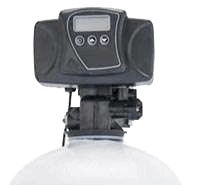
![]() High maintenance is necessary because you need to clean the system, buy salt and routinely check the system is operating correctly.
High maintenance is necessary because you need to clean the system, buy salt and routinely check the system is operating correctly.
![]() They sometimes use electricity, which can increase running costs.
They sometimes use electricity, which can increase running costs.
![]() You will still need an extra filter like reverse osmosis to filter the water and make it drinkable.
You will still need an extra filter like reverse osmosis to filter the water and make it drinkable.
![]() Salt is necessary to make soft water and this can mean a salty taste in your drinking water.
Salt is necessary to make soft water and this can mean a salty taste in your drinking water.
![]() Soft water is not safe for plants.
Soft water is not safe for plants.
Why a Salt Free Water Conditioner Might Be BETTER Than a Softener
Water softeners use salt to remove hard minerals while regenerating the resin bed. During regeneration, the positively charged sodium ions replace the hard water minerals trapped in the resin bed and the hard water concentrate is drained.
In contrast, water softeners without salt do not remove hard minerals from water.
![]() They chemically transform magnesium and calcium so that they do not stick to surfaces and fail to create white scales.
They chemically transform magnesium and calcium so that they do not stick to surfaces and fail to create white scales.
![]() Since hard water minerals are not really caught by saltwater softening systems, no salt or regeneration cycle is required to remove the minerals from the system.
Since hard water minerals are not really caught by saltwater softening systems, no salt or regeneration cycle is required to remove the minerals from the system.
Key Salt Free Softener Benefits:
Saltless softeners or salt-free softeners can be a great alternative because: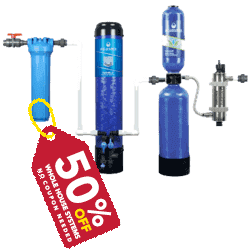
![]() You save money on buying softener salt.
You save money on buying softener salt.
![]() They are easier to maintain because they don’t need to constantly regenerate.
They are easier to maintain because they don’t need to constantly regenerate.
![]() They do not need harsh chemicals to produce what is effectively “soft water”.
They do not need harsh chemicals to produce what is effectively “soft water”.
![]() They don’t produce wastewater.
They don’t produce wastewater.
![]() Lower running costs than a traditional softener.
Lower running costs than a traditional softener.
![]() Very little on-going maintenance.
Very little on-going maintenance.
![]() No filters to replace.
No filters to replace.
![]() Usually don’t need electricity in order to run or operate.
Usually don’t need electricity in order to run or operate.
Water Softener Vs Water Conditioner Table
The concept of a salt-free softener means you get similar benefits as you would with a traditional water softener. However, here are specific differences that you should consider before making this big purchase decision.
3 Water Softener Alternatives
There are 3 main types of water softener alternatives:
- Magnetic “No Salt Softeners”
- TAC (Template Assisted Crystallization) “No Salt Softeners”
- Aquasana SCM Salt-Free Softening Technology
1. Magnetic “No Salt Softeners”
These systems are promoted on television, radio and internet. They are small (like a small shoe box) and can be installed in minutes. Just fix the wires around the pipe.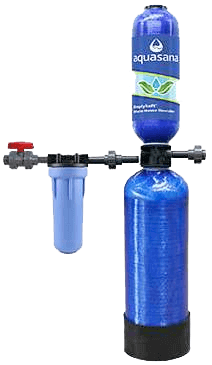
The theory of the magnetic water softener is that it uses a “complex signal field that is modulated with variable frequency and induces an electric field in the pipeline.
This changes hard water ions and increases their solubility. The result is water that is effectively “soft” because the hard minerals are displaced.
2. TAC (Template Assisted Crystallization) “No Salt Softeners”
This filter medium uses a technology called TAC (Crystalization Assisted Template). These “physical water treatment systems” are installed in a similar manner to conventional water softeners.
TAC hard water conditioners use a highly specialized medium that prevents hard minerals like calcium and magnesium from sticking to pipes and appliances.
3. Aquasana SCM Salt-Free Softening Technology
This technology naturally and safely reduces limescale deposits in plumbing and inner pipes without the use of salt or aggressive chemicals.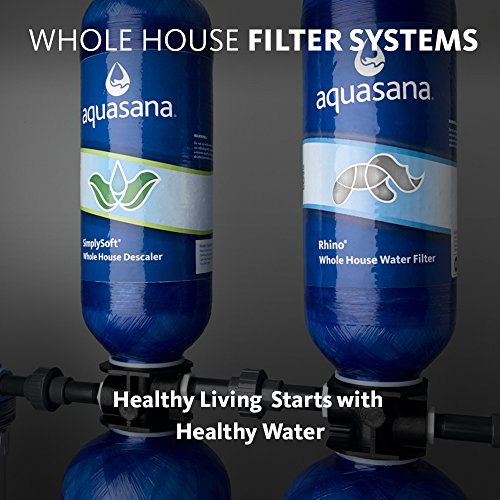
SCM stands for “Scale Control Media”. This is what uses the flow of water to naturally alter the structure of hard mineral ions in a crystalline structure.
And this is essentially what prevents the clash of minerals that form limescale. Unlike salt-based water softeners, Aquasana SimplySoft will not demineralize your water (this means it will not remove healthy minerals).
Nor will it damage your pipes with coarse salt or add excessive amounts of sodium waste to your drinking water.
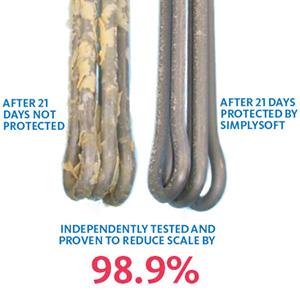 Here are some of the best benefits of using Aquasana SimplySoft:
Here are some of the best benefits of using Aquasana SimplySoft:
![]() Protects plumbing and hot water heaters from scale buildup without lowering water hardness levels.
Protects plumbing and hot water heaters from scale buildup without lowering water hardness levels.
![]() Low to no maintenance. No cleaning, no need for salt and no back washing.
Low to no maintenance. No cleaning, no need for salt and no back washing.
![]() No slimy slippery water feel.
No slimy slippery water feel.
![]() Safe for plants.
Safe for plants.
![]() Salt-free drinking water i.e. there is no extra sodium in your water.
Salt-free drinking water i.e. there is no extra sodium in your water.
![]() Doesn’t pollute the fresh water supply.
Doesn’t pollute the fresh water supply.
![]() No electricity needed.
No electricity needed.
![]() Does not waste water.
Does not waste water.
![]() Safe for septic tanks.
Safe for septic tanks.
![]() No reverse osmosis or extra filtration needed to make water drinkable.
No reverse osmosis or extra filtration needed to make water drinkable.
![]() Creates a significant reduction of hard water spots on your glassware and around your plumbing.
Creates a significant reduction of hard water spots on your glassware and around your plumbing.
How Saltless Water Softeners Work?
They work by restructuring the minerals in water so that they don’t stick to the pipes and cause hard water deposits.
Many households and businesses try to reduce the effects of hard water by installing a water softener.
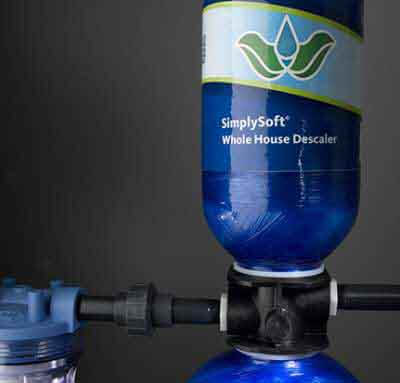 Although softeners generally work well and effectively soften water, there can be some issues.
Although softeners generally work well and effectively soften water, there can be some issues.
Conventional water softeners work by passing hard water through a cylinder containing a mechanism that replaces calcium and magnesium in water with sodium (salt).
This can mean continuous maintenance, the need to keep buying salt, the production of wastewater and the need to use electricity.
Both salt based and salt free technologies work in theory to make hard water soft. But the amount of minerals in the water does not change in salt-less water softeners.
The BEST Water Softener Alternative?
Aquasana SCM SimplySoft Salt-Free Technology.
If you want to soften water at home or in the office, but are looking for the best water softener alternative then I have identified 3 methods in this article.
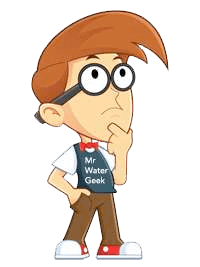 Although they generally work well and effectively soften water, conventional water softeners can be a lot of work, expensive and wasteful. You will also need to consider on-going maintenance and cost such as electricity and softener salt.
Although they generally work well and effectively soften water, conventional water softeners can be a lot of work, expensive and wasteful. You will also need to consider on-going maintenance and cost such as electricity and softener salt.
But water softeners are the ONLY way to go if you have very hard water.
Here’s a rule of thumb that can help you decide if getting a water softener alternative is right for you.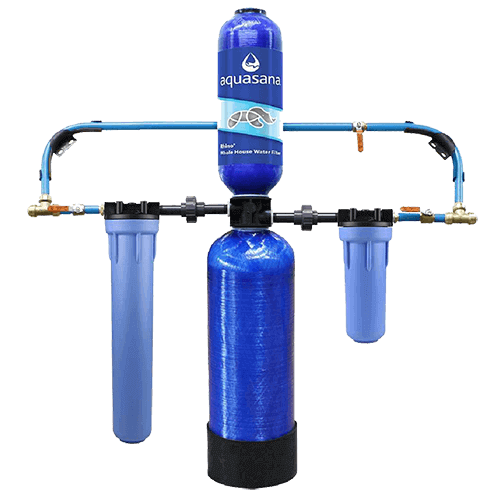
A conventional water softener is best for = hardness levels over 25 PPM
This is very hard water, lots of limescale problems and white stains around your pipes and plumbing.
Consider getting a product like SpringWell.
A water softener ALTERNATIVE is best for = hardness levels up to 25 PPM
This is low to medium hard water but you just want something to protect your pipes and plumbing as you also have a water filter. Or are buying a whole house filter along with a salt free softener.
This is the case with what is on offer from places like Aquasana.
 The Aquasana SCM SimplySoft Salt-Free Technology is behind their products like SimplySoft machine. There is also the option to upgrade for you when you buy the Aquasana Rhino Gallon OR OptimH20.
The Aquasana SCM SimplySoft Salt-Free Technology is behind their products like SimplySoft machine. There is also the option to upgrade for you when you buy the Aquasana Rhino Gallon OR OptimH20.
Aquasana SimplySoft Water Conditioner and 10-Year, 1,000,000 Gallon Whole House Filter | Aquasana SimplySoft Conditioner and OptimH20 Whole House Filter |
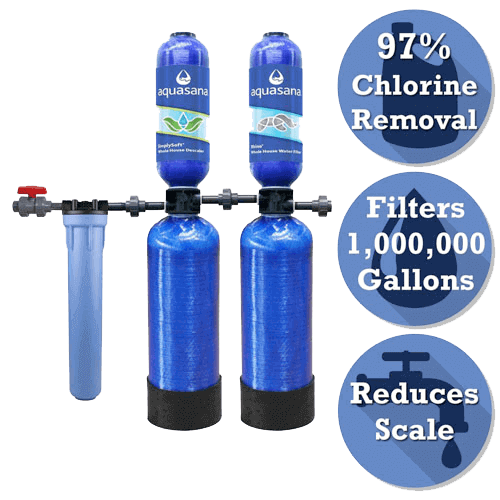 |  |
| Softens and filters | SimplySoft is a salt free"softener" only. But you can choose OptimH2O + Salt Free Softener |
| - 97% chlorine. - Cysts. - UV upgrade removes 99% bacteria, e.coli, giardia and cryptosporidium | - Over 90% chlorine and chloramines. - 99% of lead and cysts. - 99% of lead. - 98% of PFOA/PFOS  |
| - 10 year warranty. - 90 day guarantee. | - 6 year warranty. - 90 day guarantee. |
 |  |
| Sale prices automatically applied by clicking this link. | Sale prices automatically applied by clicking this link. |
| If there is *no* sale try coupon code: AQGEEK50 | If there is *no* sale try coupon code: AQGEEK50 |

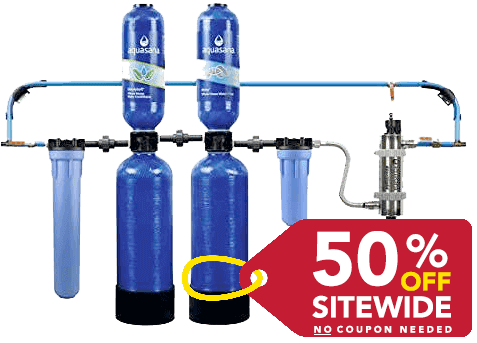
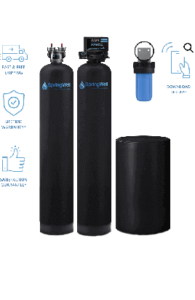
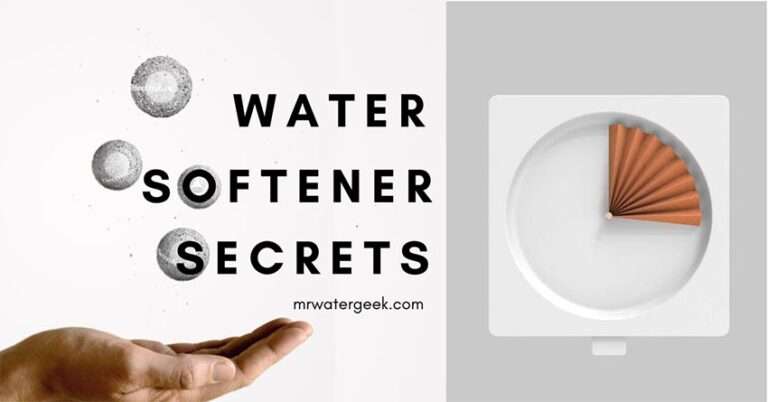
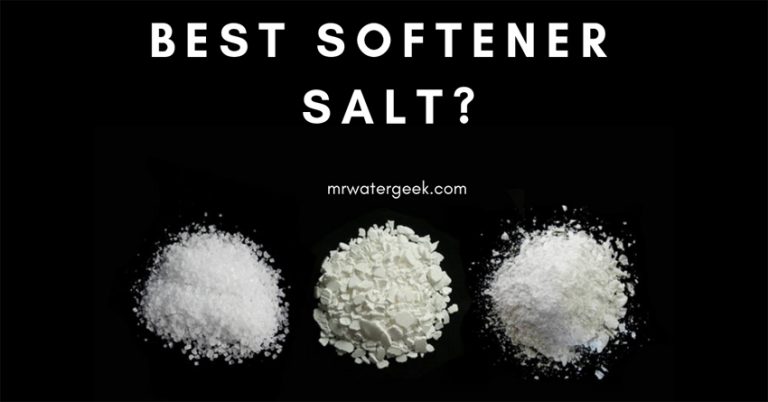
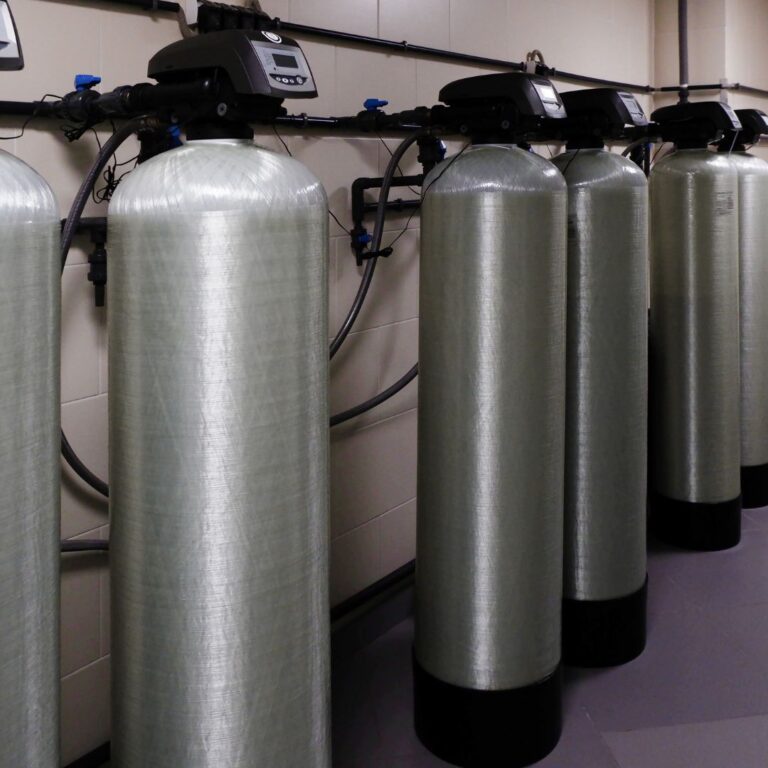
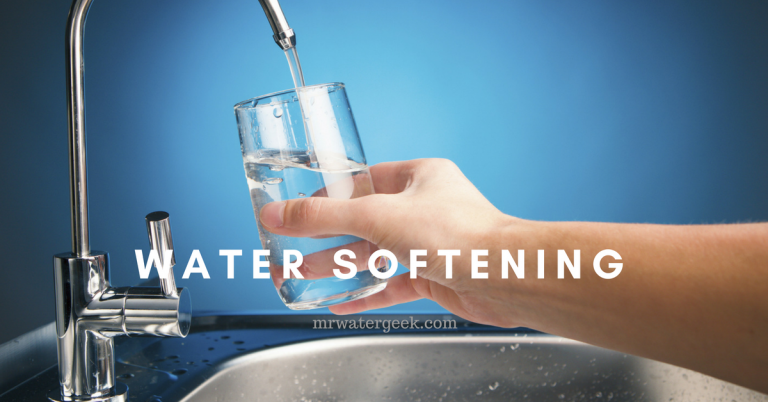
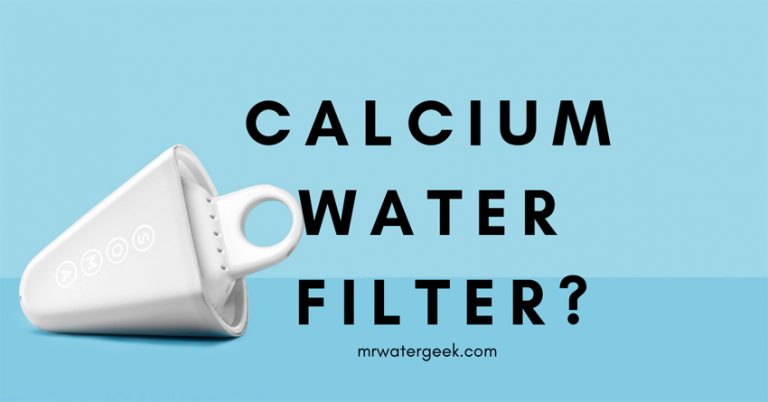
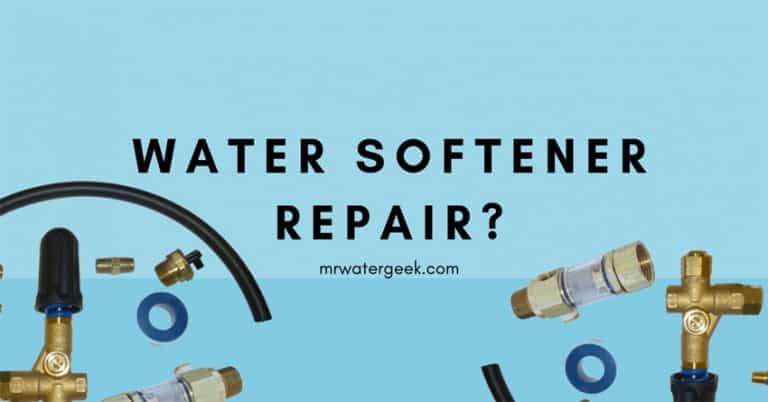
Mr. Water Geek,
I have found your site extremely helpful as I research water softeners and alternatives. I live in NC and have city water, and the water quality is driving me crazy. I have chemicals in my water (chloramines and chlorine), and a hardness of 9GPG, which is not terrible, but is annoying enough to ruin my laundry and cause significant scale buildup. In researching all the water issues that you so helpfully discuss, I have come to realize that there is a big difference between water hardness measured in Grains Per Gallon (GPG) and Parts Per Million (PPM). I notice in multiple Aquasana reviews, you mention that their softener alternative is effective for water hardness up to 25PPM. I think you mean 25GPG (this is what Aquasana specifically states). 1GPG is equivalent to approximately 17ppm, which means that a hardness of “25ppm” is less than 2GPG. That is some pretty soft water. I think it might be less confusing for people if you would update your statement regarding Aquasana. Thanks
Hi Kit
The 25PPM number comes directly from my correspondence with Aquasana.
But you are right 25PPM is ridiculously low and not good for anyone with even a moderate amount of hard water. Hence I also include an alternative offer from SpringWell, which is a salt based softener that treats extremely hard water.
If you could supply a link to where Aquasana say it’s 25GPG (and not PPM), I would greatly appreciate it.
Stay hydrated,
Luke
I have a water softener but am interested in changing. Whom can I contact in Buffalo?
Hi Judy
The best I can suggest is Amazon Plumbing as they now provide installation and old softener removal. The good thing about this is that you can check their reviews before you buy and fall back on Amazon’s A-Z guarantee if anything goes wrong.
Alternatively, you can check places like Yelp for local plumbers with good reviews.
Best wishes,
Luke